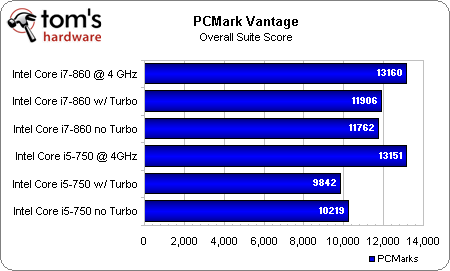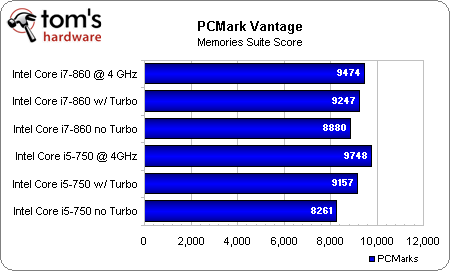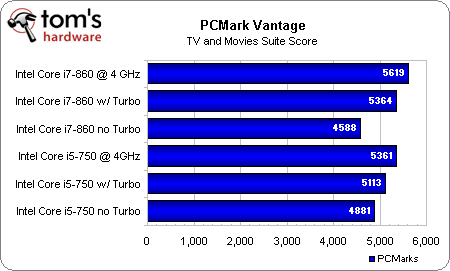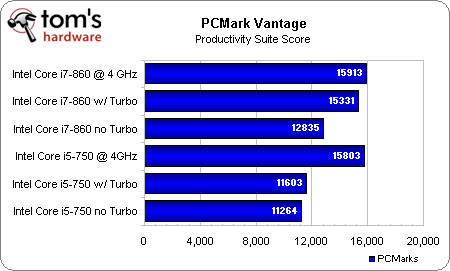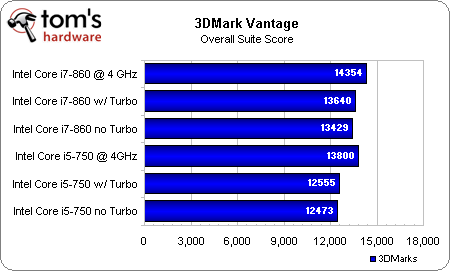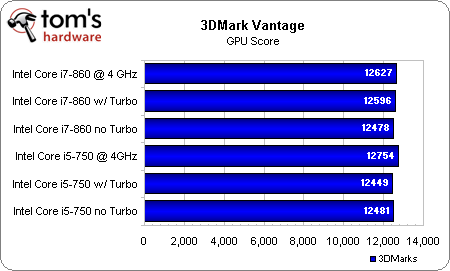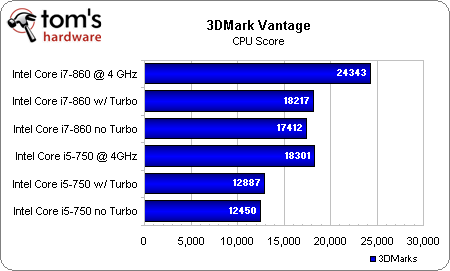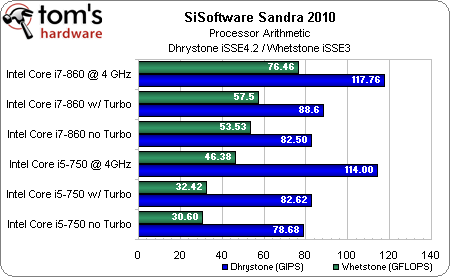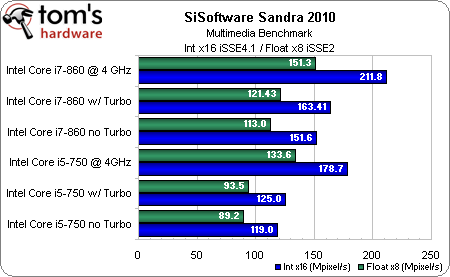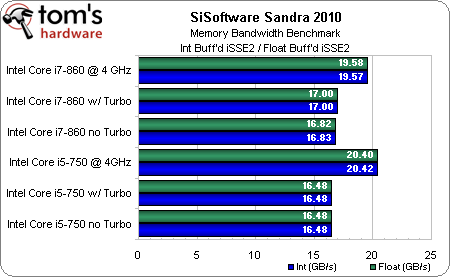Experiment: Does Intel’s Turbo Boost Trump Overclocking?
Benchmark Results: Synthetics
Our first result is already quite interesting. Mainly, we see Turbo Boost yielding minimal, if any, performance gain in the PCMark Vantage overall suite score. Meanwhile, overclocking catapults both processors forward. Turbo Boost is much more effective in the TV and Movies and Productivity tests, though overclocking is able to make an even greater impact in both cases, as we’d expect.
Interesting also is that there’s minimal benefit to Hyper-Threading—a pattern that continues throughout the suite’s sub-tests. Of course, because these are all based on features built into Windows 7, it’s possible that the operating system’s components simply aren’t as well-optimized for Hyper-Threading as Microsoft might otherwise have us believe.
Turbo Boost makes very little difference in the overall suite score of 3DMark Vantage, but it’s at least a measurable advantage in the CPU suite. It makes no difference, really, in the GPU measurement. But for that matter, neither does manual overclocking. We’re not surprised, though. Both of these CPUs are fast enough to keep from bottlenecking our single Radeon HD 5850, so we’d expect very little gaming performance increase at the hands of additional clock rate.
This synthetic is able to expose a massive performance increase via Hyper-Threading in the CPU suite, which is matched by a boost at the hands of overclocking, taking the quad-core i5-750 at 4 GHz up to the performance level of a stock i7-860. We’ll see how those results bear out in the real-world testing.
The clearest gains come from overclocking in the Whetstone iSSE3 test, where Hyper-Threading doesn’t make much of a difference. The Dhrystone iSSE4.2 metric, however, shows Intel’s Core i5-750 at 4 GHz unable to match a Core i7-860 running at its stock 2.8 GHz.
The multimedia suite similarly doesn’t show us getting much at all from Turbo Boost technology, but significant gains via overclocking both CPUs to 4 GHz. Hyper-Threading plays a significant role in both components of this one, which is interesting because we’d expect Turbo Boost to be a more impactful capability in the real-world benchmarks.
At stock speeds, memory bandwidth is largely unchanged regardless of whether Turbo Boost is enabled or disabled. This is because Turbo Boost only affects the processor’s clock multiplier, leaving BCLK settings (and thus, the related memory ratios) alone.
Get Tom's Hardware's best news and in-depth reviews, straight to your inbox.
But when we overclock, increasing the BCLK (since these CPUs employ locked multipliers), the corresponding memory transfer rate goes up as well, yielding the higher memory bandwidth numbers we see in SiSoftware’s Sandra 2010 Bandwidth benchmark.
Current page: Benchmark Results: Synthetics
Prev Page Test Setup And Benchmarks Next Page Benchmark Results: Media/Transcoding Apps-
phantomtrooper No one needs a Core i7 for gaming. I'm still using a e8400 with a gtx275 and I run everything fine at 1080p, even Crysis.Reply -
apache_lives i play GTAIV online alot - your e8400 gets left in the dust there sorry PhantomTrooper, and theres no adverse effects having spare cores for future use with newer games etcReply -
dtemple I second that, PhantomTrooper. I'm on a slightly lower end spec PC than you're using (Athlon 7750 with Radeon HD4830) and with it hooked up to my 1366x768 TV through VGA, everything I play maxes without lag. Mind you, I don't play any titles that are extremely demanding, but I'm playing 2008 and 2009 titles maxed out, on a $60 CPU and an $80 video card.Reply -
curnel_D Great article. On another note, the useless Mass Effect 2 ad blaring it's stupid music in my ears at every new page is really starting to piss me off.Reply -
cangelini Yeah, you guys are going to get a kick out of the upcoming Clarksdale story. It's amazing how badly a Core 2 Duo E8500 gets killed by a Phenom II X4 or Core 2 Quad in some of these more optimized titles.Reply
Curnel--sorry about the ad. I also find it pretty annoying to play automatically every time I open a page for proofing. I'll ask about it. -
HansVonOhain Curnel_DGreat article. On another note, the useless Mass Effect 2 ad blaring it's stupid music in my ears at every new page is really starting to piss me off.Reply
Thanks Chris for your courtesy. -
descendency Curnel_DGreat article. On another note, the useless Mass Effect 2 ad blaring it's stupid music in my ears at every new page is really starting to piss me off.I know it's not a viable solution for all, but I never have my sound on... so I didn't even notice the advert (other than seeing it.)Reply -
gilbertfh I have been building computers for myself family and friends for years and I remember some of the different ways utilized to speed up your computer (including the turbo button on your computer). This method seems like a viable way to speed up computers of those of us that don't really want to overclock.Reply
On a side note: Woot!!! I just saw the Mass Effect 2 ad has been removed. It did have the option to mute it but it was removed fast enough I didn't have a chance to check to ensure it saved to all pages. Thanks Tom's. -
gilbertfh Nope I was wrong I guess it was random and just didn't come up for a while and the mute does not save :(.Reply
